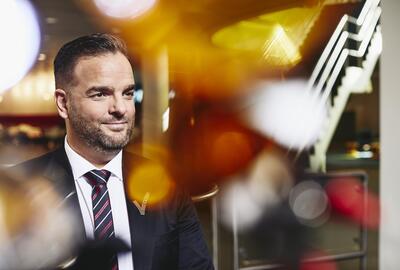Navigating the ins and outs of the job interview process can be daunting. However, the right approach can significantly increase your chances of getting a second job interview. At Randstad, we understand the challenges candidates face and are here to help every step of the way.
engagement and body language
Your body language communicates a lot during an interview. During an interview questions, it's not just about what you say but also how you say it. Remember to sit straight, lean slightly forward to show interest, and maintain eye contact with the interviewer.
These non-verbal cues show confidence and make a positive impression, showing you're a good fit. Try to use hand gestures to emphasize your points, but be mindful not to overdo it. The trick is finding the balance between professionalism and being approachable. Body language can significantly affect how you're perceived.
be an active listener
Effective communication is a two-way street, especially during an initial interview. Active listening can lead you to a job offer. While it's crucial to answer prepared questions clearly—your ability to listen attentively to the interviewer's questions and feedback is equally important.
Take note of the hiring manager's body language and verbal cues. These cues often provide insights into what they're looking for in a candidate and the type of work environment.
Show genuine interest in what the interviewer says. Try to foster a sense of connection and rapport. This will set the stage for a more productive conversation.
be authentic and honest
Trust is paramount in any professional relationship, and authenticity breeds trust. Be genuine in your responses, avoiding the temptation to embellish or exaggerate your qualifications or career goals.
Your goal is not to impress with flashy credentials. You should be prepared to answer how your skills and experiences align with the role and the company. Highlight your achievements truthfully. Always be ready to provide examples that show your capabilities.
Authenticity builds credibility and fosters a sense of transparency and integrity that resonates with employers.
maintain a positive attitude
Attitude is everything to show you're a good team member, especially in high-pressure situations like job interviews. While feeling nervous is natural, maintaining a positive attitude can help you navigate the process confidently and gracefully.
Focus on framing challenges as a chance for growth and learning, rather than dwelling on past setbacks. Explain how you've overcome obstacles and emerged stronger as a result. Positivity is contagious and leaves a lasting impression on interviewers, showcasing your resilience in the face of adversity.
prepare for interviewers
Preparation is the key to success in any endeavour, and job interviews are no exception. Research the company, its culture, and the specific role you're applying for. Familiarize yourself with recent news, industry trends, and competitors to demonstrate genuine interest and commitment.
Don't forget to prepare thoughtful questions that delve deeper into the company's mission, values, and strategic objectives—showing that you've done your homework on the company and role. Reflects well on your professionalism and allows you to engage more meaningfully during the interview. This will have you preparing for a second interview as well.
need more help with your interview preparation? we're here for you!
get more tipsshowcase yourself as a professional
Your appearance speaks volumes about your professionalism and attention to detail. Dressing correctly for the interview shows respect for the interviewer and the organization.
While the dress code may vary depending on the industry and company culture, erring on the side of conservatism is usually a safe bet. Choose attire that is clean, well-fitted, and appropriate for the environment.
Pay attention to grooming and hygiene, ensuring you present yourself in the best possible light. Remember, your outward appearance reflects your inner confidence and competence.
show warmth and respect
Building rapport with your interviewer is crucial to make a positive impression. Approach the hiring manager with warmth, sincerity, and respect. Start by greeting them with a firm handshake and a genuine smile to establish a connection.
Throughout the conversation, be attentive to their cues, listen actively, and show empathy. Express gratitude for their time and expertise, and maintain a respectful and courteous demeanour. These actions go a long way in the long term, leaving a favourable impression.
be punctual for the interview
Time is a precious commodity, and being on time reflects your professionalism and reliability. Plan your journey to the interview location carefully, allowing lots of time for potential delays or unforeseen circumstances.
Arriving early shows your respect for the interviewer's schedule. Being early also allows you to collect your thoughts and compose yourself before the interview. Use this time to review your notes, mentally prepare for the interview, and ensure you're in the right frame of mind to perform at your best.
speak with confidence and self-assurance
Confidence is the bedrock of success in any endeavour, and job interviews are no exception. Believe in yourself and your abilities, and let that confidence shine through in your demeanour and responses.
Projecting self-assurance communicates to the interviewer that you're capable, competent, and ready to tackle the role's challenges. Speak clearly and assertively, conveying your ideas with conviction and poise. Remember, you're not just selling your skills; you're selling yourself as a valuable asset to the organization.
follow-up after the interview
The interview doesn't end when you walk out of the building. Follow-up communication is crucial for maintaining momentum and reinforcing your interest in the role. Send a personalized thank-you note to the interviewer within 24 hours, expressing gratitude for the opportunity to interview.
Reference specific aspects of the conversation that resonated with you, demonstrating your attentiveness and engagement. Reiterate your enthusiasm for the role and confidence in your ability to contribute positively to the organization. A thoughtful and timely follow-up can leave a lasting impression and set you apart from other candidates.






